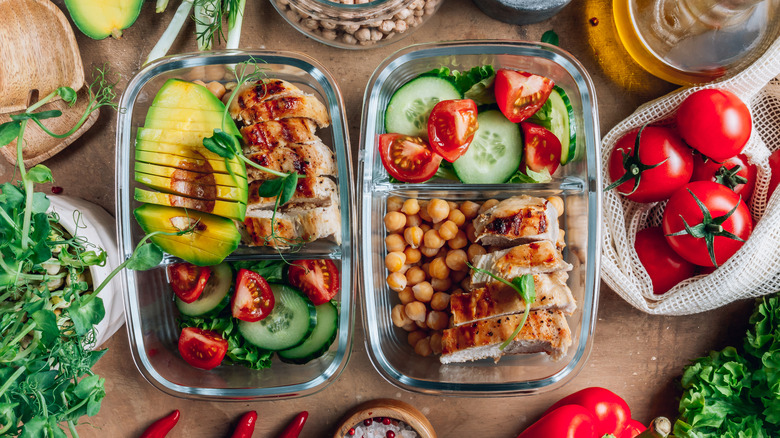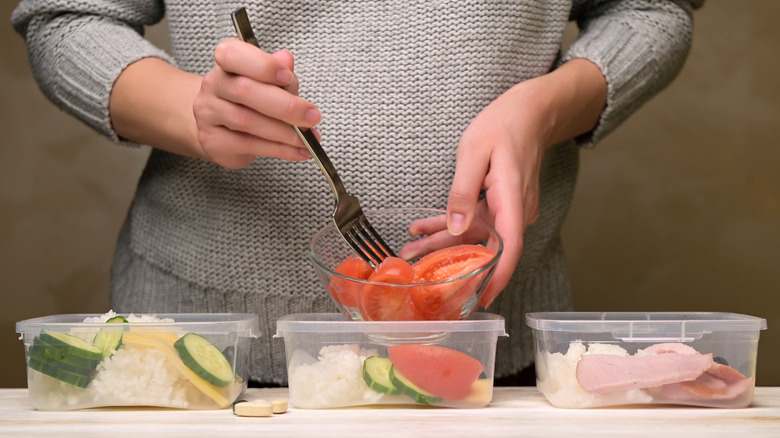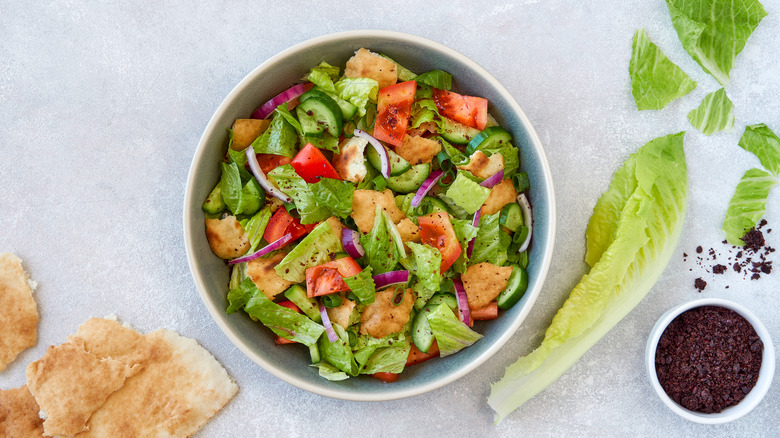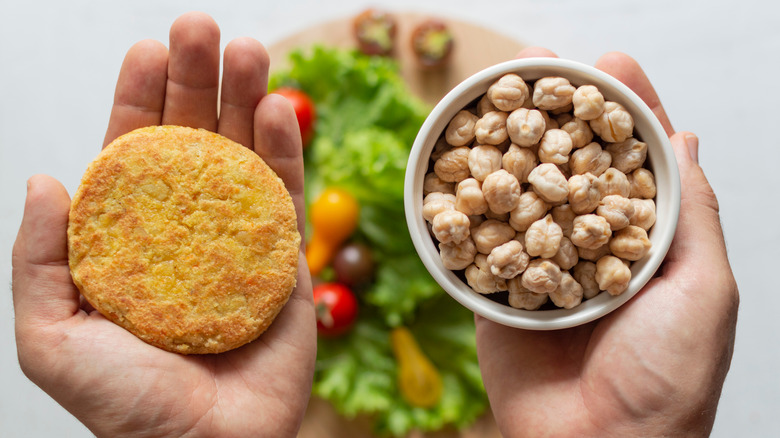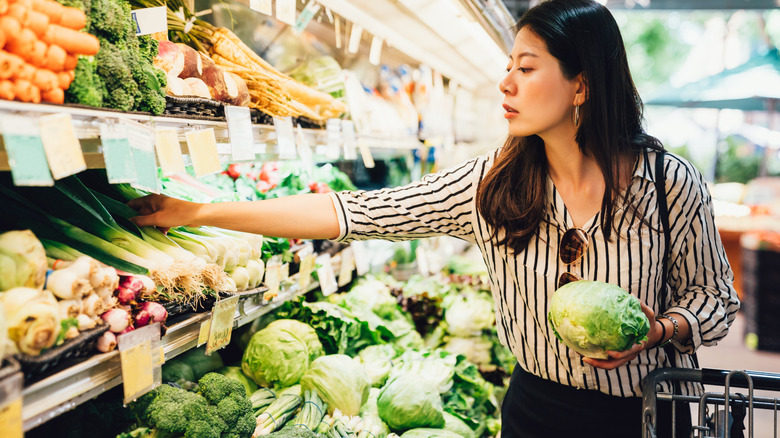If Your New Year's Resolution Is To Start Meal Prepping, Read This
Do you plan to start meal prepping and eat better this year? Planning your meals won't be easy, but it's worth the effort. When done right, it can free up your time and reduce food waste. Plus, it can take the stress out of healthy eating and bring variety to your diet. "If we can take the time out to plan meals, write a grocery list, and have fruits, vegetables, whole grains, and beans available, they will become convenient and eaten more often," explains registered dietician Silvia Veri (via Beaumont Health).
Meal prep can also make it easier to control your portions and cut out empty calories. Think about how many times you reached for cookies or pretzels just because you had no other option. "Many people like to pack all their breakfasts for busy mornings or lunches to eat at the office. Or you can also choose which meals you'd like to prep if you don't want to take on every meal for the week," said sports nutritionist Gabrielle Fundaro, Ph.D. in an interview with Oxygen.
The best part is, you can make your own rules. "There is no one-size-fits-all approach or a 'right' way to meal prep," notes Fundaro. It all comes down to your lifestyle, personal preferences, and health goals. You can prepare your meals for the day or the week ahead, try new recipes, and plan things around your macros. Here are some tips to help you out.
Keep it simple and plan ahead
The simple thought of planning your meals for the week ahead can be daunting. You might be thinking that it takes hours to look up recipes, prepare the ingredients, cook, and then store your food in containers — but it doesn't have to be this way. Keep it simple, stick to basic recipes, and cook in large batches. Oxygen suggests buying pre-chopped vegetables and frozen or canned foods, especially if you're short on time.
Frozen fruits and veggies not only last longer, but they're also easier to prepare than their fresh counterparts. Another good choice is canned tuna, which can be used in hundreds of recipes. Likewise, you may purchase canned beans, lentils, mushrooms, and olives. For example, canned beans or chickpeas don't require boiling, so you can just add them to your daily meals. They're chock-full of fiber and protein, offering both flavor and nutrition.
As far as planning goes, registered dietitian Paul Salter recommends cooking your meals on Sunday (via Bodybuilding.com). This way, you'll be able to go out or do whatever you have in mind on Friday and Saturday, and your food will still taste fresh by Thursday or so. Alternatively, you could prep your meals on Sunday and Wednesday to save time and have more wiggle room with your food choices.
Look for quick, easy recipes
Let's face it: not everyone is a great cook or has the time and energy to make fancy meals. Sure, you might want to have paella for lunch and chicken enchilada for dinner, but that's not always possible. Your best bet is to look for quick, easy recipes that take minutes to prepare and taste just as good the next day.
Think about your favorite foods and then plan your meals around them. If, say, you love salmon or beef, try pairing them with a different side dish each day. You could make roasted salmon with potatoes, spicy salmon with green beans, one-pan salmon with veggies, or salad with smoked salmon, eggs, and greens.
Registered dietician Abby Langer suggests using simple ingredients that can be repurposed throughout the week (via Self). The same goes for your go-to recipes. For example, you can bake or boil quinoa, black beans, lentils, or chickpeas and then add them to your meals. Any of these would go well in salads, tacos, vegetable dishes, omelets, and more. Plus, you can serve them with a drizzle of olive oil and lemon juice or other basic toppings when you're short on time. Another great choice is grilled or roasted chicken breast, which can make a healthy audition to pasta, salads, and vegetable-based meals.
Vary your protein sources
As a general rule, stock up on two sources of protein, four vegetables, and one starch, such as potatoes or oats, each week, says registered dietician Abby Langer (via Self). Ideally, opt for a source of animal protein like tuna or lean beef, plus a vegetable protein source. The latter category includes beans, lentils, chickpeas, tofu, tempeh, nuts, seeds, soybeans, and more.
Beef, tuna, eggs, and other animal foods are rich in protein but contain no fiber or phytonutrients. Plant-based foods, on the other hand, contain soluble and insoluble fiber, slow-digesting carbs, and certain nutrients that you can't get from meat and fish. Flavonoids, catechins, lignans, and anthocyanins are just a few examples (per Healthline).
On top of that, almonds and other plant-based proteins can make a great snack between meals. You can always bring a small bag of walnuts, pumpkin seeds, or roasted soybeans with you at work or in the car. Due to their high fiber content, these snacks keep you full longer and prevent blood sugar spikes. Dietary fiber also keeps your digestive system running smoothly and facilitates weight loss, explains the Mayo Clinic.
Be realistic about your needs
Be realistic about what you eat in a given week. Do you really need 10 different types of veggies and three types of meat? Again, meal prep doesn't have to be complicated. Stock up on essentials and take it from there. To keep things simple, opt for multi-purpose foods and then use them in a variety of recipes. This will allow you to customize your meals and track calories more easily.
Good Housekeeping suggests prepping your meals for two or three days instead of five. With this approach, you'll be better able to determine what you need to make it work. Think about food safety, too. Roasted veggies and other prepared foods last anywhere between two and five days in the fridge and three to four months in the freezer, notes Good Housekeeping. Store them in airtight bags or storage containers to preserve their flavor and prevent microbial growth.
Don't forget about herbs and spices. Basil, cilantro, black cumin seeds, chili powder, or curry can turn the most boring meal into a feast. Plus, they are loaded with nutrients that support overall health. For example, black cumin seeds contain natural compounds with anti-inflammatory, antioxidant, antidiabetic, and antibacterial effects (per Evidence-Based Complementary and Alternative Medicine). Sprinkle them over salads, use them in cooked meals, or add them to homemade bread or crackers to reap the benefits.
